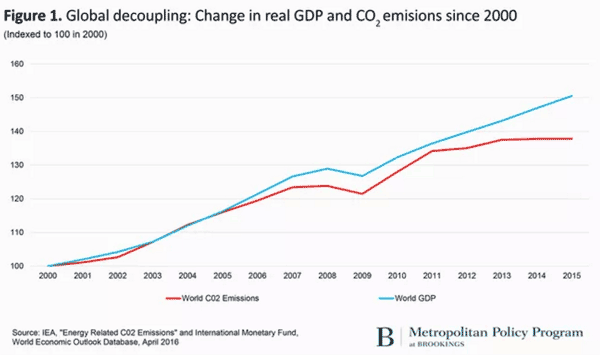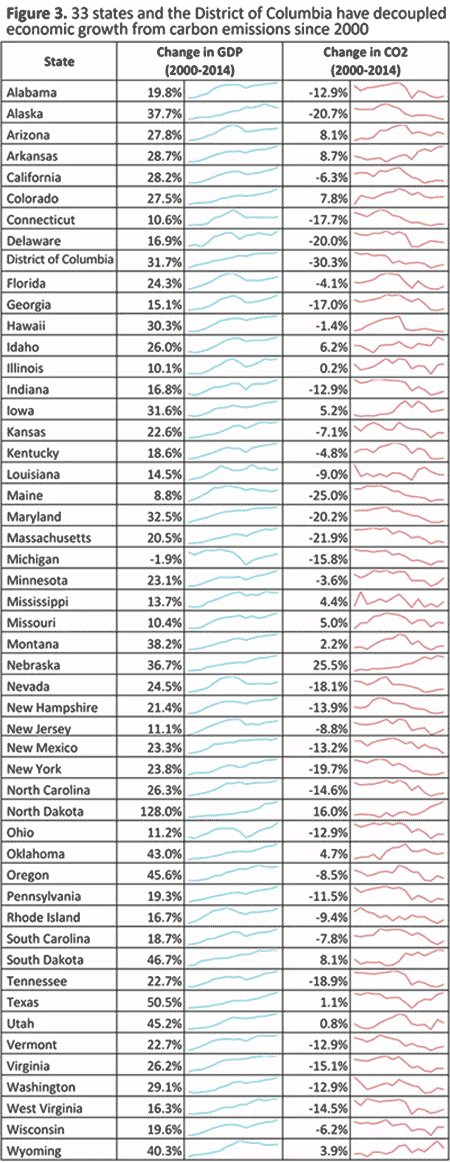To reach the UN goals for reducing CO2, it is essential that there is a so-called "decoupling" between economic growth and CO2 emissions.
While some on the far left want to see fundamental changes in the structure of the global and US economy, most climate advocates want to see robust economic growth while achieving major reductions in carbon, if nothing else because popular support for CO2 reduction efforts would likely wilt if they cause economic woes.
According to a new report from the Brooking Institute, progress is in fact being made to decouple growth and CO, both globally and in the US. However, in the US, that progress varies rather dramatically across the 50 states, with the Brookings report saying what is happening at the state level is taking on increasing importance given the apparent ambivalence of new President Donald Trump when it comes to the risks from global warming.
Brookings says that separate analyses by the World Resources Institute (WRI) and the UK-based Carbon Brief found that at least 35 countries, including the United States, had increased their real gross domestic product over the last 15 years while also reducing their CO2 emissions
Earlier, the International Energy Agency (IEA) had found that the world's emissions remained flat in 2014 and 2015 even as global GDP continued to grow by more than 3% in each year.
As shown in the graphic below, decoupling between global economic growth and CO2 emissions began in about 2005, though the gap was modest at best, before accelerating over the past three years, with growth continuing an upward trajectory even as CO emissions flatlined.
The reports cites the extreme example of the intensely urban city-state of Singapore, which saw the most dramatic decoupling, as it doubled its real GDP while slashing its CO2 emissions by 46%.
Global GDP Growth has Started to Decouple
from Level of CO2 Emissions

A similar chart in the report shows even stronger decoupling in the US, where CO2 emissions have been heading down since 2007 even as growth has been up since 2010. The report cites data between 2000 and 2015 (the latest year available for national data) showing that the United States expanded GDP by 30% while cutting its emissions by 10%, making the US the largest country that has had multiple years in which economic growth has been decoupled from growth in carbon emissions.
But that overall progress in the US masks significant difference at the state level.
Altogether 33 states and the District of Columbia managed to expand their economies between 2000 and 2014 while reducing their carbon emissions, Brooking finds, obviously meaning that 17 states did not manage this decoupling.
The report calls out Massachusetts, which cut its emissions by 22% even as its GDP grew 21%. New York and Georgia decreased their emissions by 20% and 17% while growing their GDP by 24% and 15%, respectively.
Interestingly, however, the largest reductions in energy-related carbon emissions, especially after 2007, can be attributed to the fuel use changes in the electric power sector, specfically the switc from coal to natural gas to power electricity production at many power plants. The report notes that the power of the states to regulate utilities within its borders can have a consequential impact on their CO2 emissions.
Many Northeast states have been also able to reduce their carbon emissions from importing hydro-power from Canada.
Interestingly, the report finds that wind and solar generation have yet to have much of an impact on decoupling as might be expected - even in the Green western region of the US. The report notes that "While solar and wind's share of electricity generation has been on the rise, its large-scale growth in some states dates only to the last decade, and so this analysis does not find a strong statistical relationship between states' emissions reductions and solar and wind's share of power generation."
In other words, the switch to natural gas from coal really is responsible for the lion's share of the CO2 emissions reduction.
Even in the states that Brooking cites as not reducing CO2, there was still in our view strong decoupling. For example, though 16 states, including Arizona, Colorado, Iowa, and Oklahoma, in total saw CO2 emission rise 4% from 2000-2014, that is just a fraction of their average GDP growth of 32% over the same period.
The state by state figures for changes in GDP and CO emissions from 2000 through 2014 are shown in the chart below from the report:

The report concludes by noting that "Neither the world, the nation, nor the states are making enough progress at decarbonizing the world economy, even acknowledging the genuine progress of recent years."
With uncertain support from the new administration in Washington, states are going to have to be stronger in leading the CO2 emissions charge, the report says, noting that "Policy choices at the state level are going to matter even more than in the past."
Interestingly, the report also calls on states to provide stronger support for nuclear power generation to reduce CO2.
The full repport from the Brookings Institute can be found here: Growth, carbon, and Trump: State progress and drift on economic growth and emissions decoupling
Anything in this data surprise you? Do states/regions need to take more action on CO2? Let us know your thoughts at the Feedback button below.

|